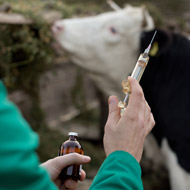
Farmers give evidence to Welsh Assembly
Farmers in Wales are suffering heartache and stress as a result of bovine tuberculosis, the Welsh Assembly’s Environment and Rural Affairs committee has heard.
According to Farmers Weekly, NFU Cymru president Stephen James said that bovine TB ‘continues to cause untold heartache and stress to cattle farmers across Wales’.
Giving evidence at the Senedd on Thursday (8 December), Mr James added that the disease was putting ‘emotional and financial strain’ on the farmers and their families.
In 2015, the Welsh government took the decision to suspend its badger vaccination programme due to a shortage of the BCG vaccine.
Since then, NFU Cymru has been calling on the Welsh Government to implement a TB eradication strategy to eliminate the disease from both wildlife and cattle.
After the meeting, Mr James told Farmers Weekly that while cattle farmers are doing their bit to tackle bTB, the government should be doing more to remove the disease from badger populations.
“We made it clear that future TB eradication measures implemented by the Welsh government should be based on sound evidence and science-based policy decision-making and that all sources of the disease must be tackled effectively if we’re ever to have any chance of eradicating bovine TB in Wales,” he said.
In November, figures published Defra revealed that the number of bTB cattle slaughtering in Wales had risen by 34 per cent.
In the 12 months to August 2016, a total of 9,630 cattle were slaughtered, compared to 7,178 in the year before.



 The latest
The latest